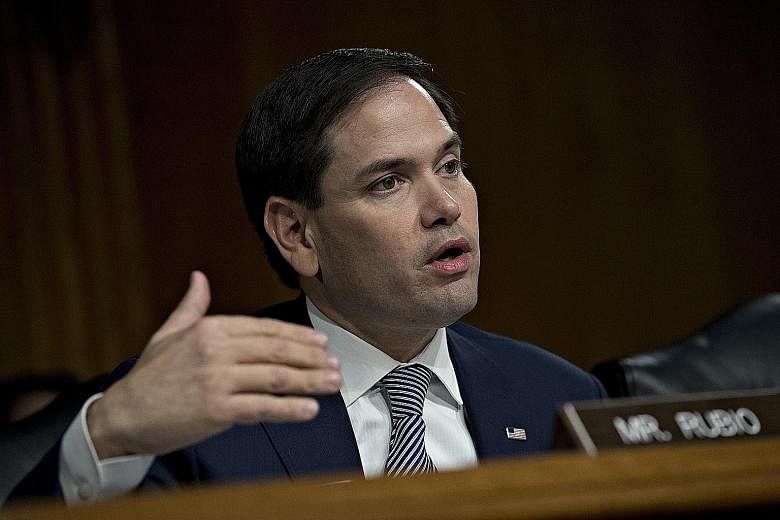WASHINGTON • North Korea's apparent offer to discuss the "complete denuclearisation" of the Korean Peninsula was met with scepticism by lawmakers and security experts in Washington.
This was even as many cautiously welcomed reports that an imperilled summit between President Donald Trump and North Korean leader Kim Jong Un may soon be back on track.
Leading senators from both parties on Sunday scoffed at the notion that Mr Kim would bargain away North Korea's nuclear deterrent, with some warning that his regime may seek significant concessions from the Trump administration in exchange for promises of arms reduction well into the future.
"I would love to see them denuclearise. I'm just not very optimistic about that," Republican Senator Marco Rubio, a member of the Senate Foreign Relations Committee, said on CBS News' Face The Nation programme.
"They're playing a game," Mr Rubio said of North Korea, which three months ago announced the successful testing of a complete deterrence system that includes thermonuclear warheads as well as intercontinental ballistic missiles capable of striking the United States mainland.
"We're talking about them because they have nuclear weapons and long-range missiles. And (Mr Kim) knows that. And so for him to give that up is going to be very difficult."
The comments came hours after Mr Kim and South Korean President Moon Jae In met in the truce village of Panmunjom to try to salvage the June 12 Trump-Kim summit in Singapore.
Speaking to reporters, Mr Moon said Mr Kim was still committed to the "complete denuclearisation" of the Korean Peninsula.
But he declined to define "complete denuclearisation" and he acknowledged that significant obstacles remain.
The State Department confirmed on Sunday that a team of US officials had entered North Korea for preparatory talks despite the uncertainty over the summit. Mr Trump announced last Thursday that he was cancelling the summit but later suggested in a tweet that the talks might go forward after all.
Several prominent US lawmakers who appeared on Sunday talk shows said they supported the idea of a summit, if only as a step towards reducing tensions.
"I think it's possible to have a constructive and positive summit," Democratic Senator Christopher Coons said on Fox News Sunday.
"I certainly prefer President Trump's choice now of diplomacy over threatening 'fire and fury'."
Some credited Mr Trump's unorthodox brand of diplomacy with helping bring North Korea to the negotiating table. "I think the President has got the North Koreans in a place that any other president might not have managed to get done," said Republican Senator Roy Blunt, a member of the Senate Intelligence Committee.
Mr Trump, he said, has shown that he is "also willing to walk away".
"I think some things need to be decided before we have that meeting," Mr Blunt said on Fox News Sunday. "There needs to be a strong understanding of what both sides - what all three sides, frankly - mean by denuclearisation."
Mr James Clapper Jr, a former director of national intelligence and a one-time senior intelligence officer for US forces in South Korea, said he worried that Mr Trump may be opening the US to demands that it scale back its strategic forces in the Pacific.
"When we say 'denuclearisation of the Korean Peninsula', this could be a two-way street," Mr Clapper said on Face The Nation.
He suggested that a worthy goal for the summit might be to establish a "regular conduit for communication" between the two countries, perhaps including the opening of diplomatic interest sections in both capitals.
"This is not a reward for bad behaviour at all," Mr Clapper said. "It's mutually reciprocal and would give us that presence there, more insight and more understanding."
From North Korea's point of view, a US presence in the country might give Pyongyang a "sense of security" against a possible US attack.
But Mr Michael Hayden, who served as Central Intelligence Agency director during the George W. Bush administration, said he worried that Mr Trump might be at a disadvantage in a face-to-face negotiation with Mr Kim.
"I don't know the President has done the kind of homework that would allow him to do this," Mr Hayden said on Fox News Sunday.
He said the "real danger" is not the rhetoric and theatrics surrounding the meeting but, rather, the substance: "What will happen at this meeting?"
"These folks are not going to get rid of all their nuclear weapons," Mr Hayden said.
"And if President Trump's brand - and that's the right word here, going into this meeting - demands something like that, this is going to end up in a very bad place."
WASHINGTON POST

